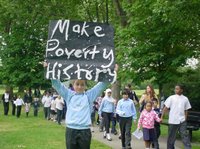A little while ago I promised to post on absolute and relative poverty, so I better do it before I forget. I was reminded by YouGov asking me a bunch of questions about it (sign up here to take part in their surveys). In order to fulfill the left wing stereotype I studied sociology at Essex University and I remember one class on this very clearly, where the lecturer was telling us there is no absolute poverty in the UK. The implication being of course what on Earth have you lot got to complain about?
In order to fulfill the left wing stereotype I studied sociology at Essex University and I remember one class on this very clearly, where the lecturer was telling us there is no absolute poverty in the UK. The implication being of course what on Earth have you lot got to complain about?
Now this was patently false and I said so. Colchester (where Essex Uni is based) has a significant level of homelessness and you can't walk down the street without someone asking you for spare change. If you've got nowhere to live - that's absolutely poverty. If you don't have enough to eat, or to keep warm in winter - that's absolute poverty. Essentially if you don't have the funds to maintain yourself - you're in absolute poverty. The national growth in GDP is irrelevant when defining the individual's circumstances.
Thankfully that's a small minority of the UK's population, but let's not turn those that are on the streets into non-persons just yet, never mind the fact that those who are visible are also an indicator of the wider poverty that lies beneath, unseen by most.
Relative poverty (which is pronounced with a silent "only" and relative in italics) is semi-officially defined as "the absence or inadequacy of those diets, amenities, standards, services and activities which are common or customary in society." Whilst I don't deny there are significant problems connected to this I do think this is where the framework begins to unravel somewhat. We can define how well off people are by how much stuff they can afford but what this is not doing is looking at quality of life. This becomes a much clearer problem when we start to compare society today with the past.
We can define how well off people are by how much stuff they can afford but what this is not doing is looking at quality of life. This becomes a much clearer problem when we start to compare society today with the past.
There are a lot more playstations and dishwashers around now than there were thirty years ago. Likewise internet access is much higher now - but are these symbols of an ever more prosperous society or simply new and increasingly unhealthy ways of using our time?
These definitions of poverty do not take into account how long we work, how often we see our kids or how happy we are. They are blunt instruments at best. I'm sure 150 channels of rubbish, vibrating cock rings, and doorbells which play yankee doodle dandy all have a place in our lives (well, yours perhaps) but I don't think we should mistake them for great leaps forward.
Take car ownership, surely it's very easy to imagine a society that is moving forwards, becoming better and more pleasant to live in which has less and less cars. It's one of the reasons why I don't think we should confuse the need for society to consume less with cuts in the qulaity of the lives we lead.
So whilst capitalism undeniably produces wealth and advances in technology it simultaneously produces poverty and steps backwards for the individual. It's impossible to measure this simply through counting how many pairs of shoes we have. At the end of the day it comes down to how our lives feel and are experienced, something that's very difficult to turn into a bar chart.
Monday, November 27, 2006
Poverty Theory
Labels: Thinking aloud
Subscribe to:
Post Comments (Atom)

5 comments:
As a fellow sociologist, I mostly agree. As long as you the means to stay healthy without having to work 60 hours a week or sell your body then you are not living in poverty.
I think it is important to reserve the term poverty for those who need it.
Spiritual poverty is another matter. Somebody could be a hunter gatherer where the only material possessions they own are a loin cloth, a spear, and a tent. However they could also be very content with their lives.
On the other hand, somebody could have all the trappings of modern life, warm house, junk food, credit cards etc. - and yet live in spiritual poverty because they cannot find any meaning in how they live.
It raises my hackles that somebody is considered to be living in poverty in the UK if they don't own a television. I would wager that those without a television might on the whole actually be less 'impoverished' than those who do - they've got other ways to spend their spare time.
There is nothing spiritual about destitution.
I know what it's like to sleep in a homeless shelter, surrounded by severely mentally ill and chemically dependant.
No glamour.
Let's talk about family and social networks rather than assuming an aggregation of free self-determining individuals.
Peter said: "It raises my hackles that somebody is considered to be living in poverty in the UK if they don't own a television. I would wager that those without a television might on the whole actually be less 'impoverished' than those who do..."
I understand and in part support your line of reasoning, but would you like to explain it to the only ten year old in the class whose parents can't afford television, CDs, a summer holiday etc...?
Polly Toynbee has commented that: "When [the Fabian Society] considered the quarter of children who never go on a summer holiday and have no money to go swimming, have a birthday party or a sleepover or take school trips, let alone own a computer or a mobile phone, they thought it unjust.
They thought it wrong that children avoid teachers' questions about what they did in the holidays, avoid collections of money, avoid PE for lack of the right kit. They understood the pain of being at the bottom of the pecking order from day one at school. Relative poverty is a dry phrase - but make it real and people feel for children born with their noses pressed against society's window."
Renegade eye - I think you miss my point. Somebody in a homeless shelter is almost certainly experiencing poverty.
Daniel - the ten year old you cite is not experiencing poverty. He is experiencing having less wealth - perhaps substantially less - than his peers. That is inequality. It is not poverty.
For lacking a television, - clearly not everybody who lacks a television does so out of choice - but this is the case for so many people who don't own one that it is useless to use it as an indicator of 'relative poverty'.
Just for clarity I want to say that whilst I was being critical of these definitions of poverty I'm not saying that living in relative poverty is nice - as I said there are significant problems connected with this.
Almost everyone in the UK can afford a TV (you can pick a cheap one up for £20) what is harder to afford is a TV licence every year and certainly things like proper school kit were the bane of my life as a kid.
However, I didn't miss the absence of foreign holidays etc because it never occured to me that they could be on the cards.
Again I'll just come back to the idea that quality of life includes more than just items possessed
Post a Comment